Related Research Articles

Paul Nicolai Hartmann was a Baltic German philosopher. He is regarded as a key representative of critical realism and as one of the most important twentieth-century metaphysicians.

Sumitranandan Pant was an Indian poet. He was one of the most celebrated 20th century poets of the Hindi language and was known for romanticism in his poems which were inspired by nature, people and beauty within.

Jean André Wahl was a French philosopher.
Mother India is the Sri Aurobindo Ashram's originally fortnightly, now monthly, cultural review. It was started in 1948, the founding editor being K. D. Sethna, who continues as editor for over fifty years.

The Sri Aurobindo Ashram is a spiritual community (ashram) located in Pondicherry, in the Indian territory of Puducherry. The ashram grew out of a small community of disciples who had gathered around Sri Aurobindo after he retired from politics and settled in Pondicherry in 1910. On 24 November 1926, after a major spiritual realization, Sri Aurobindo withdrew from public view in order to continue his spiritual work. At this time he handed over the full responsibility for the inner and outer lives of the sadhaks and the ashram to his spiritual collaborator, "The Mother", earlier known as Mirra Alfassa. This date is therefore generally known as the founding-day of the ashram, though, as Sri Aurobindo himself wrote, it had "less been created than grown around him as its centre."
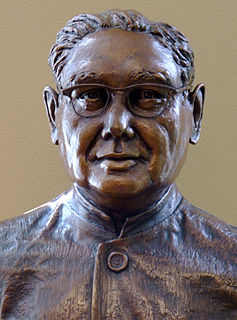
Haridas Chaudhuri was an Indian integral philosopher. He was a correspondent with Sri Aurobindo and the founder of the California Institute of Integral Studies (CIIS).
The Muirhead Library of Philosophy was an influential series which published some of the best writings of twentieth century philosophy. The original programme was drawn up by John Muirhead and published in Erdmann's History of Philosophy in 1890. This statement was published in slightly altered form in subsequent volumes:
Indra Sen was a devotee of Sri Aurobindo and The Mother, psychologist, author, and educator, and the founder of Integral psychology as an academic discipline.
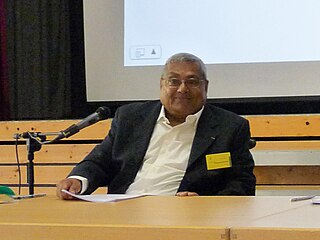
Prithwindra Mukherjee, who retired in 2003 from his career as a researcher in the Human and Social Sciences Department (Ethnomusicology) of the French National Centre of Scientific Research in Paris, is an author of a number of books and other publications on various subjects.
Ram Shankar Misra was Professor of Comparative Religion in the Department of Philosophy, Banaras Hindu University.
Arya: A Philosophical Review was a 64-page monthly periodical written by Sri Aurobindo and published in India between 1914 and 1921. The majority of the material which initially appeared in the Arya was later edited and published in book-form as The Life Divine, The Synthesis of Yoga, The Secret of the Veda, The Foundations of Indian Culture and The Ideal of Human Unity as well as a number of translations of Vedic literature.
The Advent is a quarterly magazine produced by the Sri Aurobindo Ashram, and is "Dedicated to the Exposition of Sri Aurobindo's Vision of the Future".
Sri Aurobindo Mandir Annual was first published in Calcutta in 1942. It was the first publication in which Savitri appeared in installments, in 1946 and 1947.

Prabuddha Bharata is an English-language monthly journal of the Ramakrishna Order, in publication since July 1896. It carries articles and translations by monks, scholars, and other writers on humanities and social sciences including religious, psychological, historical, and cultural themes. It has a section of book reviews where important publications from university presses from around the world are reviewed. It is edited from Advaita Ashrama, Mayavati, Uttarakhand, and published and printed in Kolkata. Prabuddha Bharata is India's longest running English journal.
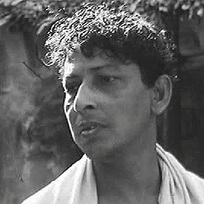
Kanu Banerjee was an Indian actor and director of Bengali cinema and theatre. He is best known for his portrayal of Harihar Ray, father of Apu, in Satyajit Ray's classic Pather Panchali (1955) and Aparajito (1956), part of the Apu Trilogy. He was born in Jodhpur, Rajasthan, India. He first appeared as an amateur artiste with Sisir Kumar Bhaduri in Biraj Bou (1934) as Netai at Naba Natyyamandir. In 1955, he also appeared as saint Ramakrishna in Prafulla Chakraborty’s biographical film Bhagaban Sri Sri Ramakrishna.
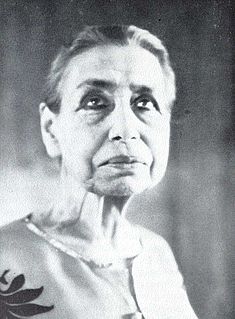
Mirra Alfassa, known to her followers as The Mother, was a spiritual guru, occultist and yoga teacher, and a collaborator of Sri Aurobindo, who considered her to be of equal yogic stature to him and called her by the name "The Mother". She founded the Sri Aurobindo Ashram and established the town of Auroville; she was influential on the subject of Integral Yoga.

Sri Aurobindo was an Indian philosopher, yogi, maharishi, poet, and Indian nationalist. He was also a journalist, editing newspapers such as Vande Mataram. He joined the Indian movement for independence from British colonial rule, until 1910 was one of its influential leaders, and then became a spiritual reformer, introducing his visions on human progress and spiritual evolution.
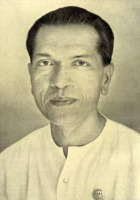
Tribhuvandas Purushottamdas Luhar, better known by his pen name Sundaram,, was a Gujarati poet and author from India.

Aurobindo's political career lasted only four years, from 1906 to 1910. Though he had been active behind the scene surveying, organizing and supporting the nationalist cause, ever since his return to India, especially during his excursions to Bengal. This period of his activity from 1906-1910 saw a complete transformation of India's political scene. Before Aurobindo began publishing his views, the Congress was an annual debating society whose rare victories had been instances of the empire taking a favourable view to its petitions. By the time Aurobindo left the field, the ideal of political independence had been firmly ingrained into the minds of people, and nineteen years later, it became the official raison d'être of the Congress.
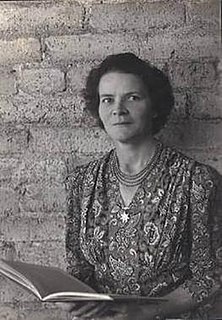
Judith Tyberg (1902–1980) was an American yogi ("Jyotipriya") and a renowned Sanskrit scholar and orientalist. Author of The Language of the Gods and two other reputed texts on Sanskrit, she was the founder and guiding spirit of the East-West Cultural Center in Los Angeles, California, a major pioneering door through which now-celebrated Indian yogis and spiritual teachers of many Eastern and mystical traditions were first introduced to America and the West.
References
- Dagobert David Runes, Who's who in Philosophy, Philosophical Library, 1942, Page 163
- Bibliography listing of Literature on Hinduism at the University of Washington.